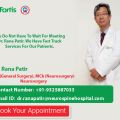Top 8 Benefits of Laser Gum Surgery

Laser gum surgery is one of the frequent uses of lasers in dental treatment. A laser is an ideal substitute for traditional, invasive procedures, whether your goal is to stop gum disease or enhance your smile. No sutures are used during mild laser gum surgery, and recovery time is short. If you're looking for alternative treatments for your dental problems, this makes the decision simple.
The main objectives of laser gum surgery are to undo the negative effects of bacteria and to assist you in keeping your mouth healthy. There are several other advantages, such as
1. Less invasive procedure
Laser surgery is significantly less invasive than previous techniques of gum surgery. Traditional gum surgery requires medical equipment to cut into the gum tissue, resulting in painful wounds that must be sewn up and healed over time. Because the laser never penetrates the gum tissue, the risk of infection, sensitivity, and bleeding following surgery is significantly lower. As a consequence, there is a low risk of complications. Because laser therapy is so gentle, many people are less hesitant to seek treatment for oral health concerns.
2. Mich quicker treatment process
The length of the procedure will depend on the extent of your gum disease or excessive gingival display. However, laser treatments are always completed much more quickly than surgical procedures, which may need several visits. COntrarily, laser treatment can be finished in only one 2-hour appointment.
3. Effective for oral infections
If gingivitis is not treated in a timely manner, it can progress to periodontitis, which, if left untreated, can result in missing teeth. Patients with severe gum disease can save their natural teeth with this laser treatment. Gum disease leads to deep pockets of bacteria that routine dental cleanings cannot completely eliminate. Dangerous bacteria are more likely to be eliminated by a laser, even when they are embedded in deep pockets.
4. Helps enhance your smile
You can smile with confidence when your teeth are straight and white. Gum health is also crucial for your sense of self-worth. Do you feel that your teeth are "short," or that your smile is "gummy"? In that case, you can finally have the stunning smile you've always wanted, thanks to laser gum surgery, which shapes your gums and removes any extra tissue.
5. No risk of healthy gum tissue
Healthy gum tissue is not harmed during laser gum surgery. The state-of-the-art laser is used to repair damaged tissue and encourage the creation of new, healthy tissue. This method is extremely accurate and precise. The laser differentiates healthy and diseased gum tissue. It will also not hurt your teeth or bones.
6. Faster recovery
Recovery from traditional gum surgery will involve pain, swelling, as well as the necessity to stay on a liquid diet. Contrarily, the recovery time for laser gum surgery is 24 hours, and most patients only feel minor discomfort. Because no cutting or stitching is necessary, laser technology allows for a quick recovery with minimal downtime. Without using traditional surgical tools such as scalpels, your dental specialist will remove less tissue, resulting in less discomfort, bleeding, and inflammation.
7. Completely safe for all patients
Surgery might be risky for those with certain medical issues. This is particularly true if there is a significant likelihood of bleeding or an extensively long healing process. But due to all the previously mentioned advantages, laser treatment is risk-free for every patient. It will lessen your discomfort, bleeding risk, and gum-line infection risk. Lasers have been shown to effectively kill viruses that might otherwise cause complications during recovery.
8. A cost-effective option
The majority of dental insurance plans will pay for necessary treatments like laser gum surgery. Laser dentistry may cost the same or less when utilized to address significant gum diseases that would have required several sessions using another treatment approach.
Other articles and publications:
Articles and publications of other companies:
- +1 (646) 270-9836
- Long Island City
- grantny.com









